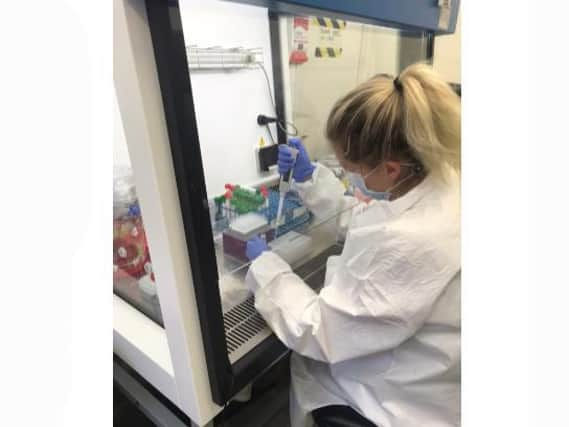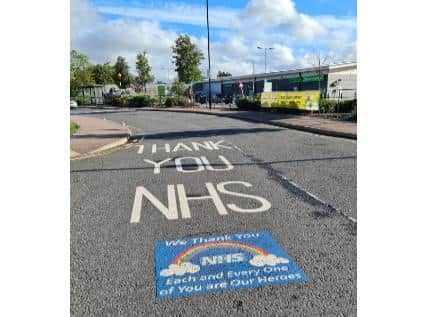Kelly shares her experiences on the frontline in the fight against Coronavirus at Stoke Mandeville Hospital


Kelly writes:
"When you’re young and dream of becoming a scientist there’s certain situations that you imagine may become a part of your life.
"I often thought about saving lives, making world changing discoveries, travelling to tropical places and mostly just wearing a white coat and goggles while playing with a Bunsen burner.


Advertisement
Hide AdAdvertisement
Hide Ad"Never in all my childish fantasies did I imagine I would be working bang in the middle of a world-wide pandemic.
"After graduating from the University of Westminster and The London School of Hygiene and Tropical Medicine with a BSc in Biomedical Sciences and an MSc in Medical Parasitology I was finally able to realise my ambition and start working as a biomedical scientist in a hospital Microbiology laboratory.
"Our normal day at work, put simply involves finding out the cause of patients infections, be it a urine infection, fungal nail or meningitis.
"80% of hospital diagnostics require us scientists to look down the microscope, grow cultures of bacteria or use state-of-the art machinery to find out what is happening in our patients and what can be done to help.
Advertisement
Hide AdAdvertisement
Hide Ad"Often I find when talking to people they don’t realise that laboratories and scientists exist in their local hospitals let alone have such a big impact on their care. Once this realisation hits many want to find out more about what happens to their swabs, urine, bloods that are taken either in the GPs surgery or in hospital.
"While you’re in A&E waiting for results of your agonising stomach pains or the reason your 5 day old baby won’t stop crying there is a flurry of activity going on behind the scenes. Doctors and nurses that have seen you and taken required samples are calling porters and scientists letting us know that you’re there and require our help.
"While you’re consciously, unconsciously or even still on the operating table waiting for your results, a doctor is often waking us up in the middle of the night to don our lab coats and assist in your diagnosis.
"Working as one big team ensures that our patient get the best care we can give.
Advertisement
Hide AdAdvertisement
Hide Ad"Most people in the UK will probably remember the West Africa Ebola outbreak in 2014, it seemed very far from home and wasn’t a daily worry in our lives.
"Because of my interest and experience I volunteered along with many others to work in Sierra Leone diagnosing cases of the Ebola virus.
"I feel this equipped me with some confidence and resilience to cope with the current pandemic but the situation feels very different when it’s happening at home.
"Because of my passion for biomedical science a friend of mine last year gave me the board game “Pandemic” for my birthday and we played it for hours.
Advertisement
Hide AdAdvertisement
Hide Ad"We managed to beat the game while sharing a bottle of wine and laughing about the unbelievable scenarios that this game proposed. If someone had told me at that time we would be playing for real in 2020 I would have assumed a conspiracy theorist or that they had been watching too many sci-fi films.
"Back in December was the first time many people had heard of Coronavirus even though throughout our lives in the UK we have probably been exposed to many different strains manifesting as a common cold or a little sniffle.
"When news reports started coming from out from China, friends and family knowing my experience asked what I thought of the situation and how serious it could become. I honestly didn’t know.
"That’s the thing with science, sometimes we just don’t know. Fast forward to January and we start getting reports of this mysterious virus making its way across the world. Scary facts and figures were being broadcast and we were preparing ourselves in the laboratory in case we were required to get involved.
Advertisement
Hide AdAdvertisement
Hide Ad"Personally I feel that when Italy was beginning to release large numbers of cases this is when I started to imagine the possibility of it reaching the UK.
"Still at this point I couldn’t envisage what was in store for all of us in the UK.
"I remember a colleague and I had a conversation about the videos we had seen coming from Italy, the queues for supermarkets and the quarantine rules made us both feel very uneasy and we said to each other “hope it doesn’t get that bad here” (How wrong we were!).
"The first sample from a suspected case that was sent to us came from a patient that had travelled to Italy and returned with the classic symptoms we all now have drummed into us. There was some adrenaline and apprehension that came with this, but as scientists we generally just want to learn as much as possible and help as many as we can.
Advertisement
Hide AdAdvertisement
Hide Ad"Our consultant Microbiologist gave us an amazing presentation about this novel Coronavirus (COVID-19) and how we can keep ourselves safe while working.
"By the end of February we were seeing large numbers of samples coming to us and by this time it wasn’t just those that had travelled abroad we were testing.
"It was in the UK and our lives were about to change. Because the virus was novel, many laboratories including ours at Stoke Mandeville did not have the equipment to test for it.
"We had to prepare and send all our samples to laboratories around the country. Fellow scientists at Southampton and Oxford NHS Trusts were our saviours during this time and coped with a massive influx of work suddenly being sent their way.
Advertisement
Hide AdAdvertisement
Hide Ad"March became the beginning of a new chapter in not only healthcare staff but everyone’s lives. Supermarkets were becoming apocalyptic and we could no longer enjoy the normal things. It sounds silly but when even McDonalds closed their doors I knew this was serious.
"Our normal working days changed with the introduction of social distancing. Due to the size of our laboratory we were unable to social distance safely.
"This meant we were split into two teams of scientists and laboratory assistants covering two shifts starting on April fools day. (Our manager had to reiterate in our email that asking us to start at 6am was not a joke).
"We were not allowed to work together and our working hours became longer, the laboratory was now staffed from 6am until 10pm (4 hours longer than normal). Although we are already a very close-knit family we became even closer in our teams.
Advertisement
Hide AdAdvertisement
Hide Ad"We relied on each other for support massively, everyone had their good and bad days myself included and I couldn’t have got through the first couple of months of this pandemic without my amazing team in microbiology. We waved to the other team at a distance during our shift changeover and let them know we were missing them all.
"But amongst all the panic and angst people were coming together in ways I had only heard about during lessons on World War 2 in school. Then claps for carers started, every Thursday was a reminder to me that we were all in this together.
"I have been lucky to witness many wonderful gestures from the public and the NHS during this time. Our Bucks Hospital trust waived the car parking fees and started providing free meals for all staff. I cannot thank the canteen staff enough for their ability to feed the whole hospital workforce while it was becoming difficult for us to get to supermarkets between shifts.
"Every morning colleagues and I would get our free breakfast baps from the canteen which definitely helped out with the 6am starts that we weren’t used to. Dinners were always hot hearty meals and it became a daily treat to have a surprise for dinner on our late shifts.
Advertisement
Hide AdAdvertisement
Hide Ad"As well as the hospital providing masses of support for us the generosity and support from the general public was incredible. The donations to all us staff were received so gratefully, after a hard shift we would go to the staff room and be greeted with wonderful surprises that would give us fresh motivation to keep going.
"We were sent lovely letters and pictures from children thanking us for what we were doing. Thank you to those children that sent them, we have them all pinned proudly on the wall in the staff room for everyone to see. Rainbows were appearing on people’s houses and during my daily walks I made it my mission to spot as many as possible.
"Random little tokens of thanks were appearing chalked on the pavement and walls, little tags hanging from fences thanking the NHS were scattered. Every single one made me smile, so thank you if you did any of those.
"On my everyday commute to work I drive past a huge rainbow painted on a wall thanking the NHS and key workers and everyday it spurs me on to do the best I can.
Advertisement
Hide AdAdvertisement
Hide Ad"In April we had our equipment delivered ready for starting the in house testing of covid-19. A small team of scientists tested the equipment ready to put into use and started training the rest of us to perform the tests.
"This was probably the most nerve-wracking training I’ve ever done.
"I was aware how quickly we needed to get up to speed plus the cost and time implications if anything failed. But we all worked together fantastically well and now between a small team we are providing a full testing service at Stoke Mandeville, processing hundreds of samples a day with one of the quickest turn-around times in the country.
"Now presents a new challenge with the lockdown lifting and life starting to go to some normality. The hospital has resumed many routine clinics, GP surgeries are resuming regular appointments and we are continuing the fight against Covid-19, meaning we are busier than ever.
Advertisement
Hide AdAdvertisement
Hide Ad"But still, even now I wouldn’t change my job for the world and I’m so glad I decided to follow my dreams and become a scientist. The inspiration for writing this article was to give an insight into the pandemic from a scientist’s point of view and to thank all those people that have helped us all get through this tough time. It’s not over yet but we can do it together."